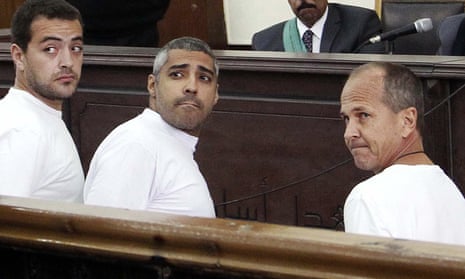Britain’s ambassador to Egypt has been summoned to a meeting with officials in Cairo after they accused him of “unacceptable interference” with the judiciary over comments he made about the convictions of three al-Jazeera journalists.
John Casson spoke out after attending a hearing on Saturday in which Mohamed Fahmy, Baher Mohamed and Peter Greste were sentenced to three years in jail for working as journalists without a licence for the television news channel.
He said he was shocked by the sentences and concerned that it would “undermine confidence in the basis of Egypt’s stability, both in Egypt and abroad.”
Egypt’s foreign ministry expressed a “strong objection” to Casson’s comments, describing them as an “incompatible with the norms of diplomatic practices”, according to a statement on its official Facebook page.
The British embassy in Cairo later said Casson met Hisham Seif al-Din, chief of staff to the foreign minister, Sameh Shoukry, at the request of the Egyptian foreign ministry.
“Ambassador Casson explained the UK position on yesterday’s court ruling set out in statements in London and Cairo yesterday, especially in light of the fact that two British nationals are involved in the case,” the statement said.
The case of the al-Jazeera journalists sparked an international outcry and raised questions over Egypt’s commitment to democracy nearly five years after an uprising toppled the autocratic president Hosni Mubarak.
Critics say their arrest was part of a crackdown on free speech waged since the army overthrew Mohamed Morsi, Egypt’s first democratically elected president, in July 2013 following mass unrest.
Greste, an Australian who was deported in February, was convicted in absentia. But Fahmy, a naturalised Canadian who renounced his Egyptian citizenship in an effort to secure his own deportation, and Mohamed, an Egyptian national, have remained in custody in Egypt since December 2013.
They were accused of broadcasting false reports and colluding with the Muslim Brotherhood, Morsi’s party, which is now designated as a terrorist organisation in Egypt. They and a further six al-Jazeera journalists were found guilty in June 2014, but their convictions were overturned and the latest sentences were handed down after a retrial.
In a statement following the ruling, Casson said: “I am shocked and concerned by the sentences issued by the court today. This case has attracted international attention not least because of the presence of foreign citizens among the accused, including two British citizens.”
He said Britain supported stability in Egypt, but added: “The question today is whether this will be a fragile and temporary stability on the basis of suspending freedoms of media and expression and depriving individuals of their rights in the Egyptian constitution? Or whether we are building a strong, long-term stability based on free expression and free media, with the rule of law applied independently to all individuals, regardless of political agendas or vested interests?”
On Saturday, Greste called on Egypt’s president, Abdel Fatah al-Sisi, to pardon him and his imprisoned colleagues. At a press conference in Sydney on Sunday, he said: “I’m absolutely devastated – sickened, frankly – by the verdict that was handed down in Egypt last night.
“This is an injustice, this is a form of suffering that they and their families are having to go through. There was never any evidence that the court presented, that the prosecution presented, either in the first trial or the second, to confirm any of the allegations against us. And in fact I’d like to publicly challenge the prosecutor to present evidence of anything that we produced that was falsified.”
The Foreign Office would not comment on Casson’s summoning by Egyptian officials and instead referred the Guardian to a statement by Tobias Ellwood, the minister for the Middle East and north Africa. Ellwood said: “I am deeply concerned by the sentences handed down against journalists in Egypt. These sentences will undermine confidence in Egypt’s progress towards strong long-term stability based on implementing the rights granted by the Egyptian constitution.”

Comments (…)
Sign in or create your Guardian account to join the discussion